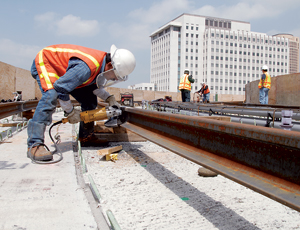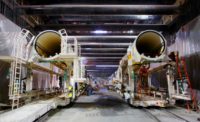After five years and six miles of track and tunnel construction, the $898-million Metro Gold Line Eastside Extension project is nearing completion without a single lost-time injury in more than 4 million work hours.

“We think this is some sort of a world record,” says Mike Aparicio, project manager for Eastside LRT Constructors, the design-build joint venture of Washington Group International, Obayashi Corp. and Shimmick Construction Corp., which holds the $600-million construction contract. “We have not been able to find [any other large federally funded transportation projects] that have had this safety performance,” he says.
The extension, to be wrapped up this summer, runs six miles from Union Station in downtown Los Angeles through Little Tokyo and Boyle Heights to the new Atlantic Station in east Los Angeles. It connects to the existing 13.7-mile Pasadena Gold Line rail system and includes eight stations and two 1.8-mi-long, 22-ft-dia. twin tunnels under Boyle Heights. Final tasks include architectural finishes and final testing on electrical systems.
Aparicio says the underground work, done below busy streets and shops, was the job’s most challenging segment but was completed with “absolutely zero interruptions to businesses or any damage to buildings.” One reason for the project’s sterling record is a “safety culture” that began at weekly “all-hands” meetings and “soon became ingrained in all the subs, designers and management” people, he adds.
“It is all about leadership,” says Joe Reed, vice president of Balfour Beatty Rail Inc., Jacksonville, Fla., the joint venture’s electrical contractor along with Steiny and Co. Inc., Los Angeles. “The safety was integrated into all aspects of the project management, with active support and involvement at the grassroots level by all employees.”
Moreover, it happened without the owner, Los Angeles County Metropolitan Transportation Authority, constantly looking over everybody’s shoulder, adds Dennis Mori, Metro project director. “We are not here to police them; we are here to monitor their activities,” he says.




Post a comment to this article
Report Abusive Comment